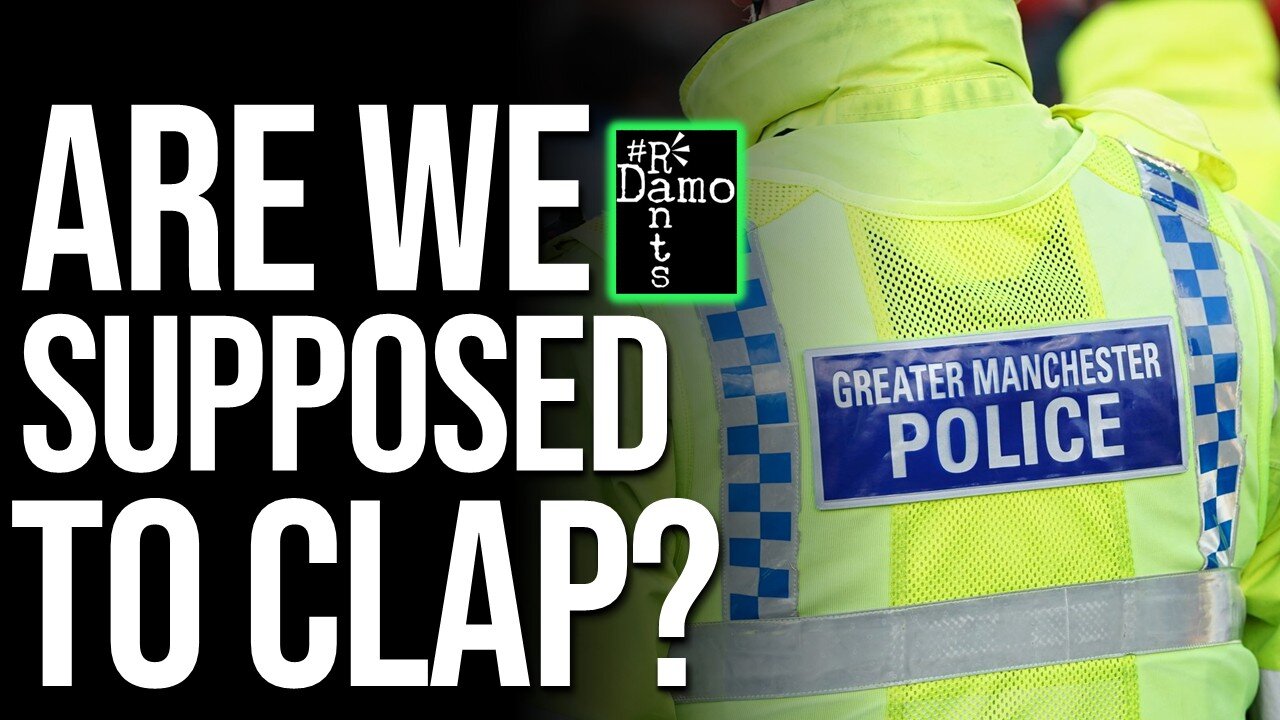Premium Only Content

Police Blamed Terror in Manchester — But They Fired Every Shot
Right, so within an hour of the Manchester synagogue attack, police PR teams were already polishing medals while the truth bled out on the pavement. “Swift,” “brave,” “decisive”—the holy trinity of state self-congratulation. Only later did the arithmetic betray them: every bullet fired that afternoon came from police guns, and one of the men they “saved” was killed by their own hands. That’s not heroism; that’s incompetence with a marketing department. But in Britain, the uniforms always write the headlines, and the dead are left to footnote themselves. The question isn’t whether mistakes were made—it’s how many more times the same force can shoot first, spin later, and still call itself protection. This isn’t a tragedy. It’s a rerun. And the credits are rolling before the truth even starts.
Right, so Greater Manchester Police were quick to brief the press. Within hours of the 29 September attack outside Heaton Park Hebrew Congregation, their statement described an “immediate and heroic armed response” that had “saved lives.” For several news cycles that was the story: officers acted swiftly, a suspected terrorist was shot dead, worshippers were safe.
Then came the detail that rewrote the entire narrative. GMP confirmed that every round discharged during the incident had been fired by police and that one of the civilians who died, 53-year-old Adrian Daulby, may have been hit by their bullets. May is doing some heavy lifting there, the police were the only ones armed with guns. The Independent Office for Police Conduct has opened an investigation. “We are aware one of those fatally injured may have been shot by a police firearm,” its initial statement read. Various news outlets have all reported that line almost verbatim. By the next morning the question was unavoidable though: if the only gunfire came from officers, how exactly did the deaths occur?
Two men—Daulby and 66-year-old Melvin Cravitz—had tried to hold the synagogue doors shut when the suspect, Jihad al-Shamie, attempted to force entry while apparently wearing a vest with visible wires. Police arriving on scene fired live rounds and killed al-Shamie. Both Daulby and Cravitz also died at the scene. No explosives were found. What began as a “terror attack foiled” quickly turned into an inquiry about police marksmanship and judgment.
The official line is a familiar. Officers “had only seconds to act.” The public is reminded of “extraordinary pressures.” It’s a difficult argument to immediately refute ahead of an inquiry. But this is also not the first time Greater Manchester Police have defended lethal force with that argument. The Anthony Grainger Inquiry—ordered after an unarmed man was shot dead during a 2012 surveillance operation—found there had been no lawful basis to open fire. The 2017 IOPC report into Jordan Begley’s death described the Taser use as “excessive and unreasonable.” GMP apologised, promised lessons had been learned, and carried on.
That history matters because it defines the culture behind this latest tragedy. When a force repeats the same pattern—fatal misjudgment, hasty justification, procedural investigation, no prosecution—it ceases to be accident and becomes institution. The same procedural reflexes were visible here: an early press release highlighting bravery, ministers echoing praise before evidence had been examined, and a delay in releasing basic forensic information such as distance, trajectory, and timing. Though it is still early days.
Operation Kratos, the post-7/7 “shoot-to-kill” doctrine, still shapes armed policing in Britain. It authorises officers to shoot a suspect in the head if they believe explosives are present. The policy’s first victim, Jean Charles de Menezes, was innocent. No one was convicted. The principle survived. The Manchester incident shows how that logic continues to govern decision-making even when the threat is unverified. If the vest was fake—as it was—then the justification collapses. If officers truly believed it real, firing risked detonation. Either way, the tactic defeats its own rationale.
Politically, the government’s response followed the same script. Ministers praised “outstanding bravery,” called for calm, and quietly shifted the discussion toward “community safety.” Home Office briefings to journalists focused on “potential lone-actor extremism” rather than on the conduct of the armed unit. Within twenty-four hours the event had been repurposed as evidence for more surveillance powers. None of this is coincidence. Britain’s security apparatus treats every operational failure as justification for expansion. The worse the error, the greater the call for resources to prevent the next one.
Media coverage amplified that framing. Early headlines accepted police language wholesale. Only independent outlets asked the obvious question: how could all the gunfire come from police yet still be described as a “foiled terror attack”? When the IOPC statement finally acknowledged the likelihood of police responsibility, mainstream coverage softened rather than hardened. The vocabulary changed from heroism to “tragedy” but the underlying assumption—that lethal mistakes are inevitable—remained untouched.
The human cost, meanwhile, risks being buried under that semantics. Two local men are dead, one apparently by friendly fire, and their families are now trapped in a procedural limbo that could last years. The IOPC will take statements, collect forensic reports, and eventually issue recommendations phrased in the neutral language of bureaucratic regret I daresay, but I remain open to being surprised. If precedent holds, the force will accept “organisational learning,” issue a carefully balanced apology, and move on.
For Manchester residents this pattern will be familiar. GMP has been under special measures since 2020 after inspectors found systemic recording failures and serious leadership deficiencies. At that time, nearly one in five reported crimes was going unrecorded. A force in that level of institutional disarray is not one that should be operating on hair-trigger doctrines, yet it continues to do so under political protection. Every failure becomes another argument for more funding and fewer questions.
The victims deserve better than administrative sympathy. They deserve a transparent timeline: when did officers arrive, who gave the order to fire, and how many rounds were discharged? The public still doesn’t know. GMP has not released the body-worn video or the radio transcripts. Without them, “seconds to act” remains a slogan rather than evidence.
The larger issue is not only about one force but about Britain’s relationship with policing itself. When the instinct of the political class is to praise before verifying, it signals that accountability has become performative. The state has learned that the quickest way to contain outrage is to call its own errors “acts of protection.” It worked after de Menezes, it worked after Grainger, and it is working again.
Yet beneath that choreography, something fundamental is eroding. Public trust is not infinite. Each time a force shoots the wrong person and survives the scandal, the line between law enforcement and impunity blurs a little more. Communities begin to see the police less as guardians than as a separate class—one that kills, investigates itself, and calls the result case closed.
Manchester knows that cycle well. It lived through the Arena bombing inquiry, where failures of coordination cost lives and officials congratulated themselves on “rapid response.” The city rebuilt faith once before. This time the damage runs deeper because the bullets came from inside the system, not against it.
What happened outside that synagogue is therefore more than a local tragedy; it’s a national test of credibility. The question is brutally simple: can the state admit it killed the very people it claims to protect? If it cannot, then “public safety” has lost all meaning hasn’t it?
The official narrative hasn’t just blurred the truth; it’s inverted it. Ministers and senior officers keep using the word protection when what we are watching is exposure — exposure of a system that cannot handle its own authority. “Seconds to act” has become a catch-all defence that empties accountability of content. It is supposed to sound brave, but it translates as we fired first and will explain later.
That culture comes from the top. The Home Office still measures success in numbers of arrests, not in absence of error. It rewards aggression over restraint and wraps it in the language of national security. After Manchester, the first political instinct was not self-examination but policy opportunism. Talk turned immediately to new surveillance powers, expanded “lone-actor” monitoring, and restrictions on protest — as if more control were the only cure for official incompetence. The state never wastes a crisis; it repurposes it.
Media performance followed the pattern. The same outlets that quoted police statements as fact have since moved on to morality. There are columns about “rising extremism,” hand-wringing about “community cohesion,” and not one serious examination of the doctrine that made this possible. When large outlets describe a police killing as “tragedy,” what they mean is done, dusted, please turn the page. The narrative management is almost automatic. For government, the incident is a reminder of its indispensability; for media, a chance to repeat the comforting fiction that Britain’s institutions, while fallible, always act in good faith.
The Independent Office for Police Conduct is supposed to break that loop. It rarely does. Its reports arrive years later, written in cautious legalese — in line with policy at the time, reasonable belief of imminent threat. These are phrases designed to close questions, not answer them. The IOPC doesn’t lack integrity; it lacks power. Without prosecutorial authority it can only recommend, never compel. In practice, that means the police remain the final editors of their own history.
Every previous case proves the point. The Grainger Inquiry found unlawful force. No officer was convicted. The Begley report found excessive and unreasonable conduct. No prosecution followed. Each episode ends with the same abstract language: learning opportunities, policy review, training improvements. None of it changes the reality that armed policing in Britain still operates on a presumption of correctness. The burden of proof always falls on the dead.
Behind that legal choreography sits the doctrine that makes all of this inevitable — Operation Kratos. Introduced in 2005, it authorises instant lethal force against any suspect believed to carry explosives. It was meant to be used only in extraordinary circumstances; two decades later it is institutional instinct. It turns “belief” into permission. Heaton Park shows how brittle that logic is: if every visible threat can justify immediate killing, then every mistake is pre-authorised. The state gets to manufacture danger, react to it, and call the outcome security.
For the communities that live under this model, the damage all adds up over time. Trust evaporates first, then cooperation. Jewish congregations in Manchester have been left traumatised by both the attack and the revelation that police bullets may have killed their own. Muslim communities nearby have been subjected once again to collective suspicion, questioned about “radicalisation” they had nothing to do with. Each group is treated as a potential problem to be managed rather than as citizens entitled to transparency. Fear becomes the organising principle of policy; empathy is outsourced to press officers.
This pattern extends beyond policing. Every time a domestic security failure occurs, the political answer is to narrow the civic space. After de Menezes, surveillance powers expanded. After the 2011 riots, stop-and-search widened. After every protest that embarrasses government, new public-order restrictions appear. Just look at the arrests of people holding placards over Palestine to know that to be true. Now, after Manchester, the discussion is shifting towards even tighter control of demonstrations deemed “provocative.” The cycle feeds itself: the state overreaches, the media reframes, the public is told to be grateful for the discipline imposed on it.
Britain has learned to confuse order with safety. It is easier to talk about cohesion than about competence. But the cost of that confusion is visible in every inquiry file gathering dust. The repetition of failure is not accidental; it is policy inertia backed by political convenience.
Accountability begins with evidence, yet even that remains locked away. GMP has not released the body-worn footage or the radio traffic from the scene. The public has been asked to trust a chronology that only the institution itself can see. Transparency delayed is truth denied. When evidence stays hidden for months or years, the outrage cools and the system wins by exhaustion or forgetfulness.
So what would genuine accountability look like? First, disclosure — the release of footage, ballistic data, and command logs. Second, reform of doctrine: remove the presumption that lethal force is the default response to uncertainty. Third, independent prosecution authority for cases involving deaths in custody or police fire. Without those steps, nothing changes except the names of the dead.
There is still a moral argument beneath the technical one. A democracy cannot maintain credibility if its armed officers kill civilians and its ministers call it success. Nor can it preach human-rights law abroad while practicing impunity at home. Britain’s claim to be a rules-based society depends on visible accountability; secrecy corrodes that claim faster than corruption ever could.
For Manchester, this is personal. The city has rebuilt itself after worse, but each time it has demanded honesty first. The Arena Inquiry forced emergency services to admit catastrophic delays. This moment requires the same honesty from its police. Otherwise the next time sirens sound, the public will wonder not what danger is coming, but from which direction.
The conclusion writes itself. Two men are dead. Every shot fired came from police. The only confirmed explosives were in the language of official statements. Until the footage is released and the chain of command is made public, we are being asked to take the state’s word for an event in which the state was the sole gunman. That is not accountability. It is self-absolution.
And that, ultimately, is why this story matters beyond Manchester. Because if an institution can kill the people it is supposed to protect, investigate itself, and call the result “heroism,” then the definition of public safety has been rewritten in real time. If it can happen there, it can happen anywhere.
For more on these tragic events in Manchester and the talk that this might well have had Israeli involvement even, do check out this video recommendation here as your suggested next watch.
Please do also hit like, share and subscribe if you haven’t done so already so as to ensure you don’t miss out on all new daily content as well as spreading the word and helping to support the channel at the same time which is very much appreciated, holding power to account for ordinary working class people and I will hopefully catch you on the next vid. Cheers folks.
-
 LIVE
LIVE
StoneMountain64
2 hours agoBattlefield 6 Flick Keybind is WILD
121 watching -
 LIVE
LIVE
The HotSeat
3 hours agoTrump "The Peacemaker", Unless You're Antifa!!! Part II
373 watching -
 LIVE
LIVE
Film Threat
1 day agoVERSUS: TRON: ARES VS. TRON LEGACY VS. TRON! BATTLE ON THE GRID! | Film Threat Versus
32 watching -
![[Ep 768] Trump: The President of Peace | Schumer Looking Worse by the Day | Columbus Day](https://1a-1791.com/video/fwe2/d0/s8/1/g/Q/s/q/gQsqz.0kob-small-Ep-768-Trump-The-President-.jpg) LIVE
LIVE
The Nunn Report - w/ Dan Nunn
1 hour ago[Ep 768] Trump: The President of Peace | Schumer Looking Worse by the Day | Columbus Day
146 watching -
 LIVE
LIVE
Owen Shroyer
26 minutes agoOwen Report - 10-13-2025 - Senate Town Hall with Lindsey Graham Opponent Mark Lynch
405 watching -
 2:50:34
2:50:34
Side Scrollers Podcast
4 hours agoTony Blair SHILLS For Digital ID + UK BLOCKS 4Chan + Hasan DogGate ESCALATES + More | Side Scrollers
24K7 -
 1:01:37
1:01:37
DeVory Darkins
3 hours ago $26.37 earnedHostages released as Trump delivers historic speech... Portland descends into bizarre protest
94.4K75 -
 LIVE
LIVE
Jeff Ahern
1 hour agoMonday Madness with Jeff Ahern
190 watching -
 7:23
7:23
Michael Heaver
4 hours agoThis Scandal Could FINISH Starmer
4.43K3 -
 1:06:45
1:06:45
Timcast
4 hours agoTrump WINS, Will Federalize IL Guard, Billionaire Warns CIVIL WAR Has Begun
154K180